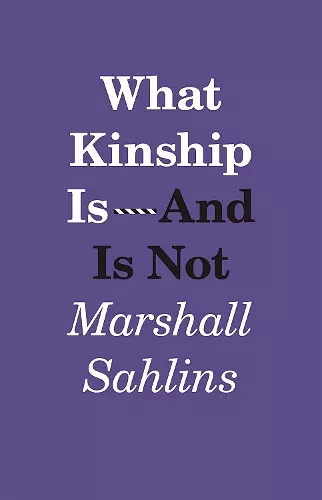What Kinship Is-And Is Not
Format:Hardback
Publisher:The University of Chicago Press
Published:12th Feb '13
Currently unavailable, and unfortunately no date known when it will be back

In this pithy two-part essay, Marshall Sahlins reinvigorates the debates on what constitutes kinship, building on some of the best scholarship in the field to produce an original outlook on the deepest bond humans can have. Covering thinkers from Aristotle and Levy-Bruhl to Emile Durkheim and David Schneider, and communities from the Maori and the English to the Korowai of New Guinea, he draws on a breadth of theory and a range of ethnographic examples to form an acute definition of kinship, what he calls the "mutuality of being." Kinfolk are persons who are parts of one another to the extent that what happens to one is felt by the other. Meaningfully and emotionally, relatives live each other's lives and die each other's deaths. In the second part of his essay, Sahlins shows that mutuality of being is a symbolic notion of belonging, not a biological connection by "blood." Quite apart from relations of birth, people may become kin in ways ranging from sharing the same name or the same food to helping each other survive the perils of the high seas. In a groundbreaking argument, he demonstrates that even where kinship is reckoned from births, it is because the wider kindred or the clan ancestors are already involved in procreation, so that the notion of birth is meaningfully dependent on kinship rather than kinship on birth. By formulating this reversal, Sahlins identifies what kinship truly is: not nature, but culture.
Janet Carsten, University of Edinburgh "Clearly destined to become something of a classic in kinship studies in anthropology. This is partly because of the huge breadth of Marshall Sahlins's scholarship, which takes in everything from Aristotle to the most up-to-date references in the study of kinship, including a wonderful range of standard and lesser-known works along the way. But this of course is not just a work of synthesis; it is also an original, brilliant, and, above all, creative contribution to current debates in the discipline." Eduardo Viveiros de Castro, Federal University of Rio de Janeiro "The work of Marshall Sahlins has continuously inspired whole academic generations of anthropologists. As with many of his previous interventions, this bold and incisive essay will be hailed as a beacon of lucidity in the somewhat foggy conceptual landscape of current anthropology. The all too neglected structuralist insight of the radical identity between sociality and semiosis is rescued and developed by Sahlins in a wonderfully refreshing way, with the help and the benefit of an easy, capacious scholarship that embraces everything from philosophy to linguistics to contemporary ethnography (from the Nichomachean Ethics to Benveniste on pronouns, from Amazonian couvade to Maori gift-exchange). This book musters deep and convincing arguments in favor of a thoroughly relational human ontology, bodying forth a renewed notion of internal or intrinsic relationality, which runs counter to the current infatuation with substances and impenetrable essences. It shows that what is natural in human culture is what is cultural in human nature: kinship, precisely." Alan Rumsey, Australian National University "What Kinship Is - And Is Not is a tour de force, even by Sahlinsian standards. Kinship is one of the oldest topics in anthropology, but by the 1970s it began to lose its centrality, partly under the weight of critiques which denied the cross-cultural validity of 'kinship' as an analytical category. Sahlins develops an incisive counter-critique of that position while at the same time radically reframing kinship as 'mutuality of being,' which he takes to be a pan-human phenomenon. A superb piece of anthropological writing, this book does a wonderful job of ethnographically substantiating that concept, along the way making several other major contributions to anthropological theory." Thomas Trautmann, University of Michigan "In What Kinship Is - And Is Not, Marshall Sahlins argues that kinship is culture, not biology, and he does so in the pure, uncompromising, vivid way of which he is the master. We now have the case for the cultural interpretation in the strongest imaginable form, which is at the same time a case for not splitting the difference in the quandary at the heart of kinship studies. It is a service of inestimable value, and all who study kinship will benefit." Robert Parkin, Anthropological Quarterly "Marshall Sahlins is one of the great names of modern anthropology, but thus far he has not counted as one of the key figures in the study of kinship... but [The Use and Abuse of Biology] and the present text both show that Sahlins is knowledgeable about kinship and entirely capable of contributing something new to debates concerning it... He has clearly ransacked the most recent literature in the search for relevant ethnography, though he also finds support for his argument in some of the older literature, going back to Tylor in 1865, and even to Plato. The basic theme, therefore, is not new, though his treatment of it is. Sahlins has given this phenomenon a name - "mutuality of being" - and that in itself will compel us to take notice of it."
ISBN: 9780226925127
Dimensions: 22mm x 14mm x 1mm
Weight: 284g
120 pages